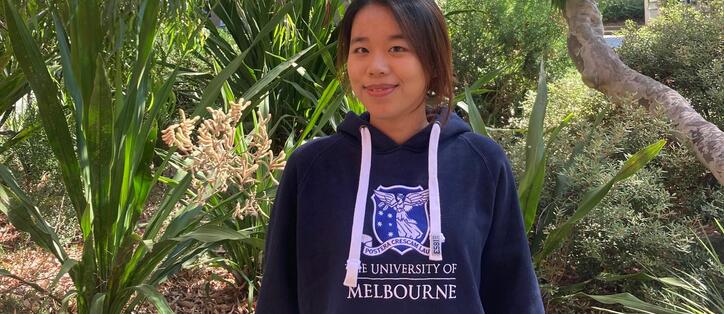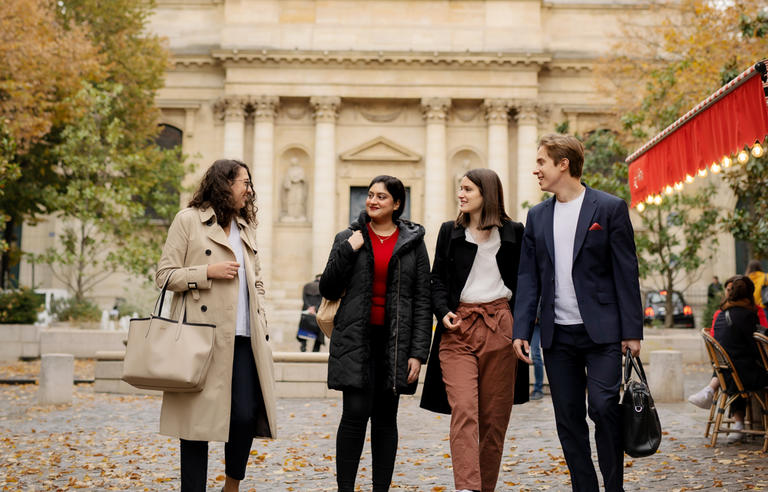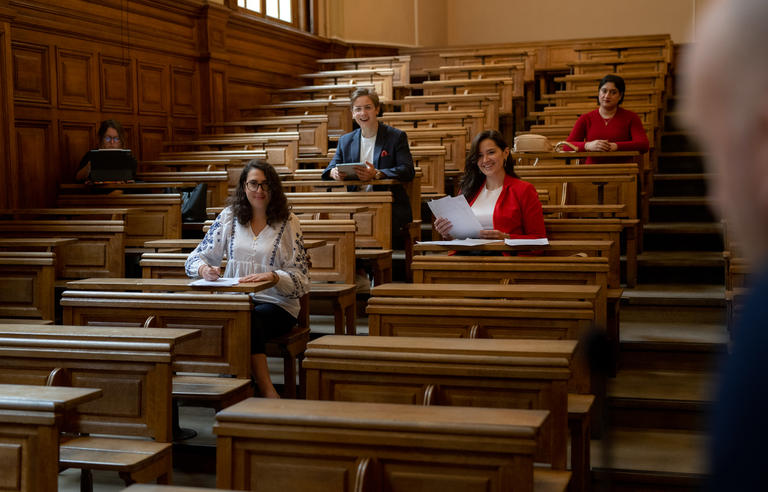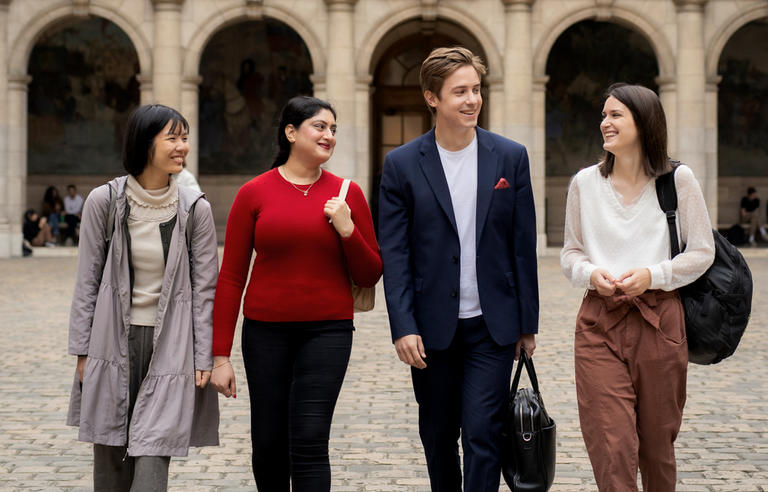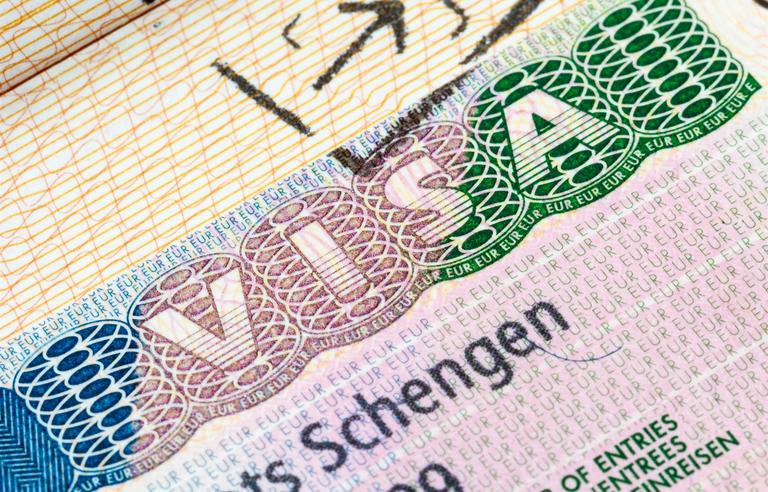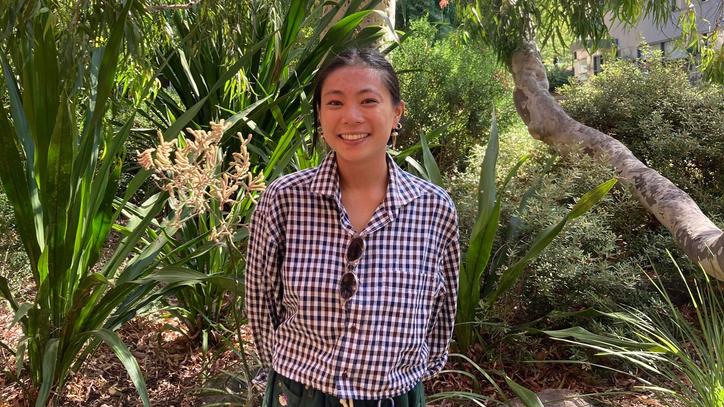
Learning French in Australia
Meet Sarasa, a French student at the University of Melbourne and President of the French Club at University of Melbourne.
She tells us about her experience learning French and how she stays connected with France while in Australia.
CF: Hi Sarasa, thanks for joining me today. Can you tell me a bit about yourself?
I study a bachelor of arts majoring in linguistics and anthropology, and I'm doing a diploma in French. It's my second year at the University of Melbourne.
CF: And you're studying French at Uni Melb as well, what's that like?
It's really flexible so I'm doing a diploma just because I want to do more French subjects and I can do it concurrently with my bachelors. But if you wanted to, you can always do it as a minor for a French study. The environment I've had in classrooms have been really welcoming and the teachers are also supportive and encouraging. And you know, they're always there to help you outside of class as well.
CF: What made you want to learn French?
It was taught at my high school. And I went on a trip with the school in year 10 and a three-month exchange in year 11. And that exchange really made a difference because you're immersed in the culture and you stay with a host family. You go with people and what it's like to be at the school. It was really beneficial linguistically. I do think like a a high school trip is nice too, because you're just young enough that you don't have any pre judgments on anything, no prejudices, you're just open to everything. And it’s easier to meet people as well to make friends in a school environment.
CF: Yeah. Do you feel that you're still friends with the people you exchanged with?
I was in touch for a few years, it's been like 5-6 years I've lost contact, but if I go to France maybe I'll try and reach out again.
CF: That would be really cute, it would be such a great reunion story. So, what do you see yourself doing with French language in the future?
In a more technical sense, because of my majors, linguistics and anthropology, having another language that's different systematically to English is quite beneficial just in getting exposure to literature and being able to talk to like a double amount of people. Also, I guess it's interesting to look at the colonial legacy in both English and French sides. Also, running the French club has given me a lot of practical skills, so for example reaching out to contacts or organising events, it's a lot of soft skills that are involved for leading a committee.
CF: OK, so you think that beyond just learning the language, it's actually also helpful because French and through the French club has actually brought you valuable skills for your career?
Yeah, of course. It's more opportunities out there, more so than just because you could speak the language but never know how to use it.
CF: I definitely think the skills you get from the French club, that's really interesting and I do think it will actually benefit you, your CV. I think when [employers] look at your CV later, having either an experience abroad or experience running a club instantly separates you from other people who've just done a degree and have not had any like work experience or international experience. It's great how much it makes you grow as a person.
CF: How do you feel like you stay connected to France while in Australia?
Mostly through the French club. We're trying to do a bit more outreach with the French community, the francophone community in Melbourne, because we know there's a lot out there, but we do have a big influx of exchange students, international students from France who are here. We just haven't been able to dive out of the university walls, but it's on the agenda. The main one would be Alliance Française Melbourne and we've gotten in touch with them. And hopefully we can do like a collaboration event, whether it's showing festival or volunteering or even just any of their events. Because what we've found is their events tend to attract older generations, wheras ours is exclusively pretty much university students and we’re the demographic they're missing out on and vice versa. And it's a networking opportunity for our students and members as well. Personally, through the club, I mean a lot of other people that have similar interests relating back to French, whether that's books or movies or music. Otherwise, it would be just listening to music or watching movies. Just popular culture.
CF: Yeah, there's so much good French music, do you know Aya Nakamura?
Yeah, I love her music. Unfortunately, I’m not taking any French courses this semester, so it's good to have so many different ways to stay connected.
CF: What do you think is the most overrated food in France?
Honestly, French coffee. Melbourne coffee is way better.
CF: Do you have any final comments that you think would interest people learning French?
Yeah, in general, like cultural exchange is really good cause especially in Melbourne it's so multicultural. But you don't realise how people's behaviour might be influenced by the cultural background or the linguistic background. Like you might think someone's rude for being 5 minutes late but it's just their norm. So it just gives you that little bit of tolerance and understanding afterwards. And it goes to the other way around. Like you might realise that what's normal for you might be considered rude. Or, you know, out there it's nice to like look at drawing culture from outside of you.
Also, there’s a lot of stigma around accents. When people speak French, they say “I'm so sorry for my accent.” And I’m like, dude, you can speak another language and you're trying. That's the best bit. I feel like if you have an accent, you should be proud of it because it means that you've got some kind of cultural background behind it and it's nothing to be like apologetic or ashamed of. It means you speak another language which is so impressive.
CF: I totally agree. For French, something that blocks a lot of people speaking is the confidence. Because the moment that you're trying to speak the language, it doesn't matter if you have an accent and you shouldn't be nervous about speaking. My number one recommendation whenever people learn French is just practising more confidently because you'll improve by practising and if you don't practise cause you're too shy, you'll never get better.
Thanks so much for talking with me today, I really enjoyed it and I hope you continue to stay connected with France and the Francophone community around the world!
Join the French Club at UniMelb here! They offer conversation classes, free events and lots of opportunities to practice your French.
If you aren't a UniMelb student and you want to stay in touch with France, almost all universities in Australia have a French club you can join to practice your French. The blog Sacreblue also shares lots of French cultural offerings and events.
Recommended testimonials
